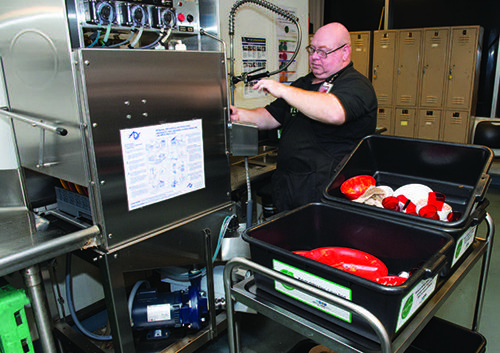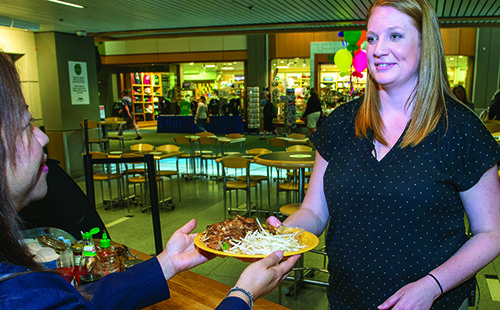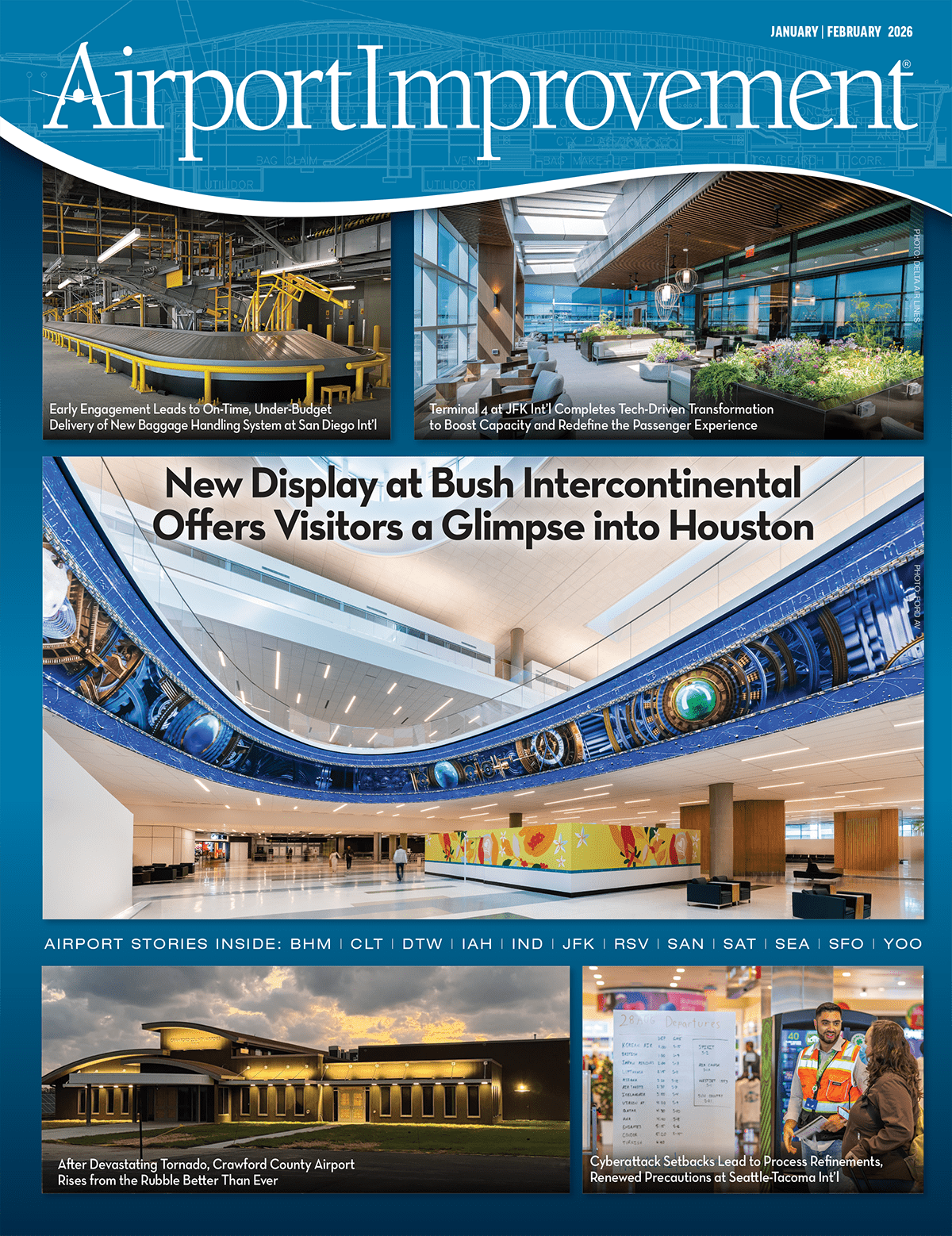The Green Plate Program, introduced just a few months ago at Portland International (PDX) in Oregon, gives customers at its main pre-security food court the choice of having their food prepared “for here” or “to go.” Meals ordered “for here” are presented on melamine dishes, with drinking glasses and metal silverware that are washed and used again. Customers who want their orders “to go” receive them in disposable paper and plastic containers, with plastic silverware.
Adding to its established history of environmental action, Portland International (PDX) in Oregon is stepping up to the plate—literally and figuratively—to reduce the amount of plastic single-use containers that end up in its trash.
The Green Plate Program, introduced just a few months ago, gives customers at its main pre-security food court the choice of having their food prepared “for here” or “to go.” Meals ordered “for here” are presented on melamine dishes, with drinking glasses and metal silverware that are washed and used again. Customers who want their orders “to go” receive them in disposable paper and plastic containers, with plastic silverware.
Six vendors currently participate in the program: Bangkok Xpress, Blue Star Donuts, Sumo Sushi, Flying Elephants Delicatessen, Maruti and Panda Express.
|
facts&figures Project: Green Plate Program Location: Portland Int’l Airport (OR) Program Site: Clocktower Plaza (main pre-security food court) Strategy: Offer customers option of using reusable service ware & utensils vs. single-use plastic versions Participating Vendors: 6 Busing/Dishwashing Service: Relay Resources Est. Annual Operating Costs: $98,400 Anticipated Savings for Garbage Disposal: $2,000/yr. Test Program: April-June 2017 Cost of Pilot: $43,000 Funding: $29,871 from the Oregon Dept. of Environmental Quality; $12,860 from Port of Portland Initial Cost of Dishes: $6,000 Results of Pilot: 3 participating concessionaires reduced their to-go packaging by 73%, collected/composted 374 pounds of food waste & reused 10,000 dishes Key Benefits: Reduces plastic waste; upgrades dining experience for customers; reduces airport’s garbage disposal expenses; reduces concessionaires’ cost for plastic to-go containers |
Importantly, the new waste reduction program does not create extra work for participating concessionaires. The airport’s janitorial partner, Relay Resources, delivers, buses and washes the dishes and silverware. After “for here” customers finish eating, they place their dishes into one of 11 collection trays on top of trash cans throughout the food court. Relay Resources delivers them to the kitchen and loads them into a high-powered commercial dishwasher that cleans the dishes in only three minutes. In the first few weeks of the program, the maintenance contractor ran an average of 45 loads of dishes per day.
“A load of dishes can be washed and sterilized in only three minutes,” says PDX Media Relations Manager Kama Simonds. The new Energy Star dishwasher the airport installed in August uses only 1 gallon of water per cycle, she adds.
Testing the Concept
The Green Plate Program was created after a 2017 study showed that disposable to-go containers and utensils made up nearly one-third of waste from the food court area—even though more than 75% of customers consumed their orders within the food court. The Port of Portland, which owns and operates PDX, subsequently launched a pilot program with three concessionaires to reduce waste from single-use food packaging.
During the pilot, a majority of customers chose to “eat in” off reusable plates and utensils.
“We called this ‘Green Plate’ because in the pilot program, all three vendors had green plates. Now, each of the six participating restaurants has its own designated dish color,” explains Simonds. “Each concessionaire was given several options and chose the types of dishes that fit its business. Some wanted one big plate, some wanted a specific type of bowl, some wanted a plate with dividers.”
 The results of the pilot program encouraged PDX to press ahead. “During the three-month pilot, participating vendors reduced their to-go packaging by 73%, collected and composted 374 pounds of food waste, and reused 10,000 dishes,” Simonds reports.
The results of the pilot program encouraged PDX to press ahead. “During the three-month pilot, participating vendors reduced their to-go packaging by 73%, collected and composted 374 pounds of food waste, and reused 10,000 dishes,” Simonds reports.
After the pilot ended, the airport solicited input from the three participating concessionaires and Relay Resources to develop the full program that launched in August 2019.
Although this program is still new, the results have been encouraging. “We are still gathering data, but so far we have decreased waste in the food court by at least 25% percent,” says Simonds.
One Vendor’s Perspective
Bangkok Xpress signed on for the Green Plate Program after participating in the pilot from April to June 2017. Cheryl Nhun, who has owned the airport concession for three years, estimates that about 50% of her customers opt for reusable plates and utensils.
“It has worked out very well for us,” says Nhun. “Our customers seem to like it…and I like that the airport gave us choices in the types of plates we use. We offer 18 items on our menu, which require different types of plates. We have a medium-sized standard plate, a plate with three compartments and some bowls for the curry dishes. I also like that all of our dishes are yellow, which is a cheerful color.”
Nhun also likes that the program saves her restaurant money. “We have been doing this for only a few months, but so far we are saving about $1,000 a month on purchasing plastic products,” she reports. “That will really help our bottom line as time goes on.”
Costs
The pilot program that tested the Green Plate concept cost about $43,000. A grant from the Oregon Department of Environmental Quality provided $29,871 to purchase reusable dishes, additional janitorial help to wash the dishes, and consultant support to manage and collect data for the program. The Port of Portland provided $12,860 in matching funds for personnel costs associated with program management.
Estimated annual operating costs for the full program are $98,400. “We expect this cost to go down with reduced janitorial labor, and with an estimated $2,000 a year we expect to save in reduced disposal costs for garbage,” Simonds forecasts.

Holistic Effort
The airport has been working to reduce landfill waste for years with programs such as the PDX Food Donation Program and annual spring and fall cleanups, which allow tenants and airlines to drop unneeded business furniture, displays and electronics to be donated and recycled.
“We are trying to look more holistically at the amount of waste generated by the airport and work collaboratively with our partners and concessionaires to try to reduce and eliminate waste,” Simonds explains. “We do use a bit more water, but the overall conservation benefits of the Green Plate Program make it worthwhile. We look at this undertaking as a good customer service option for our travelers.
“In the future, we hope to extend this program to all food court areas in different terminals,” she adds. “But for now, we will keep this in the pre-security food court.”



